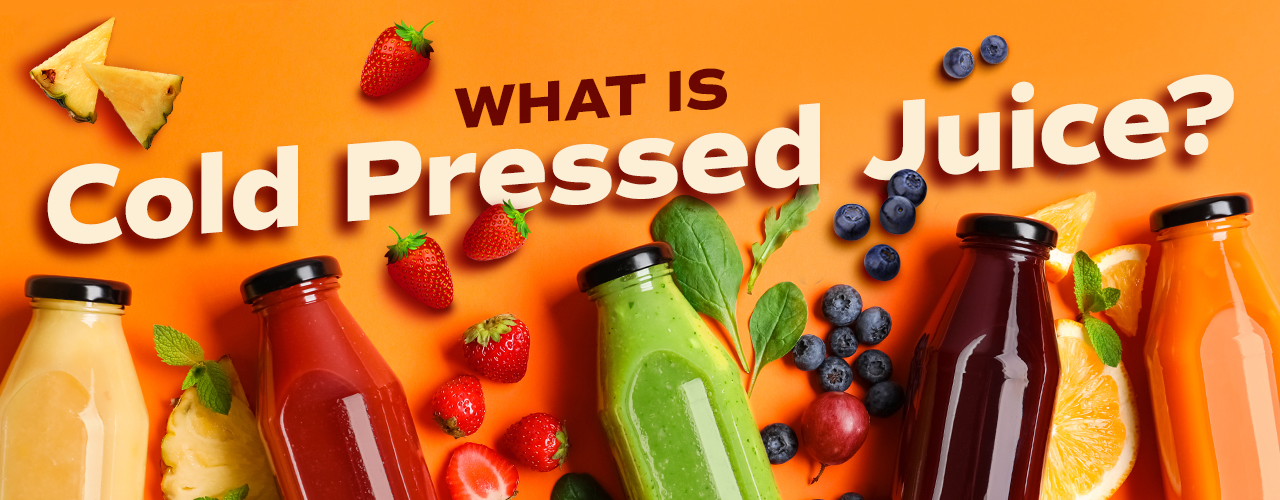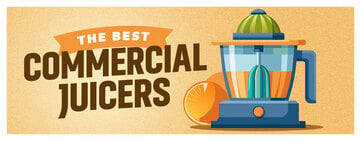Unlike traditional juicing methods that use high-speed blades to extract juice, cold-pressed juice is made by pressing and squeezing fruits and vegetables. This gentle extraction process helps to preserve the maximum amount of vitamins, minerals, and enzymes found in the produce. With its numerous health benefits and delicious flavors, it's no wonder that cold-pressed juice has gained popularity among health-conscious individuals and commercial establishments alike. Read on to discover everything you need to know about this trendy type of juice and how your business can integrate it into your menu.
Shop All Juice ProductsCold-Pressed Juice Video
To learn about the features and benefits of cold-pressed juices, watch the video below.
What Is a Cold Press?
A cold press is a type of juicer that uses hydraulic pressure to extract juice from fruits and vegetables. Unlike traditional juicers relying on high-speed blades or centrifugal force, cold press juicers operate much slower. While other juicers generate heat during the extraction process, cold press juicers use a hydraulic press to squeeze the juice out of the produce. This minimal heat exposure ensures that the juice's nutrients, enzymes, and vitamins remain intact.
How to Cold Press Juice
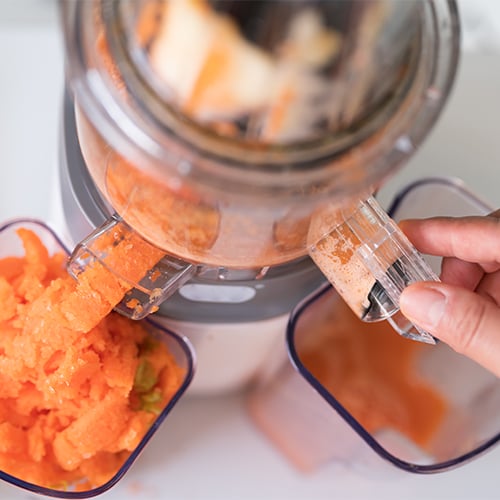
To cold press juice, you will need a cold press juicer, also known as a masticating juicer. Cold press juicers use a slow, grinding motion to extract juice from fruits and vegetables, resulting in a vibrant and nutritious product. By following these steps, you can create your own cold-pressed juices, ensuring a healthy and refreshing beverage option for your commercial establishment:
- Prepare Your Ingredients - To begin, select the fruits and vegetables you want to juice. It's important to use fresh, high-quality produce to ensure the best flavor and nutritional value. Wash and peel your ingredients as needed, removing any seeds or tough stems.
- Slice Produce - Next, cut your fruits and vegetables into smaller pieces that will fit into your juicer. Different fruits and vegetables may require different cutting techniques, so be sure to follow the specific instructions for each ingredient.
- Assemble Your Cold Press Juicer - Now it's time to set up your cold press juicer. This involves attaching the juice container, placing the pulp container, and securing the juicing mechanism.
- Start Juicing - Once your juicer is fully assembled, begin feeding the prepared ingredients into the machine. Use the plunger or pusher provided with your juicer to slowly and gently press the produce into the juicing mechanism.
- Collect the Juice - As the juice is extracted, it will flow into the juice container. You can use a separate container or a glass to collect the juice.
- Separate the Pulp - After juicing, you'll be left with a pulp residue. This can be collected in a separate container or discarded, depending on your preference.
Cold Press Equipment and Tools
To properly make cold-pressed juice, a variety of tools and equipment are required to extract the full nutrient and flavor profile of the fruit. With the right setup, cold pressing juices become a simple and efficient task, allowing you to handle a high volume of orders. Below, we’ll cover the necessary equipment and tools you'll need to get started and how to use each tool in the cold pressing process:
- Cold Press Juicer - This specialized machine is designed to extract juice using a hydraulic press. Look for a juicer that fits your budget and meets your specific requirements.
- Cutting Board and Knife - A sturdy cutting board and a sharp knife are essential for prepping your ingredients. Ensure that your knife is sharp enough to cut through tough fruits and vegetables with ease.
- Containers - You'll need containers to collect the juice and separate the pulp. Glass or BPA-free plastic containers are popular choices for storing cold-pressed juice.
- Plunger or Pusher - Most cold press juicers come with a plunger or pusher to help feed the ingredients into the juicing mechanism. This tool ensures safe and efficient juicing.
Is Cold-Pressed Juice Good for You?
Cold-pressed juice is known for its high concentration of vitamins and antioxidants. Compared to other types of juice, cold-pressed juice often contains more fiber. The hydraulic press used in the cold press extraction process helps to extract juice from the entire fruit or vegetable, including the pulp and skin. This means that the resulting juice retains more fiber, aiding digestion and promoting feelings of fullness.
Benefits of Cold-Pressed Juice
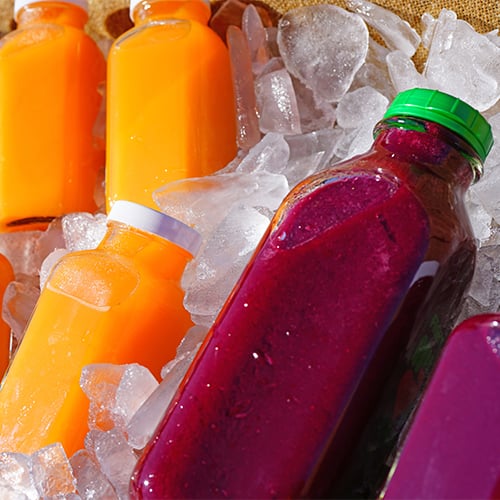
Cold-pressed juice offers a range of benefits that can support your overall health and well-being. From providing essential nutrients to aiding digestion and promoting detoxification, these refreshing beverages are a great addition to a healthy lifestyle. Let’s take a look at some of the reported health benefits of consuming cold-pressed juices:
- Antioxidants - One of the key benefits of cold-pressed juices is their high concentration of antioxidants. Cold-pressed juices retain more antioxidants compared to other juicing methods, as the low heat and slow extraction process help preserve the nutrients.
- Anti-Inflammatory Properties - Cold-pressed juices, especially those made with ingredients like turmeric, ginger, and leafy greens, contain natural compounds that can help reduce inflammation in the body and promote overall wellness.
- Improved Digestion - Cold-pressed juices are often made with a combination of fruits, vegetables, and herbs that are rich in fiber, enzymes, and other digestive aids. These nutrients can help support a healthy gut by promoting and improving nutrient absorption.
- Boosted Immune System - Many fruits and vegetables used in cold-pressed juices, such as oranges, lemons, and leafy greens, are packed with immune-boosting vitamins and minerals. Regularly consuming cold-pressed juices can help strengthen your immune system, making you less susceptible to common illnesses and infections.
Cold-Pressed Juices
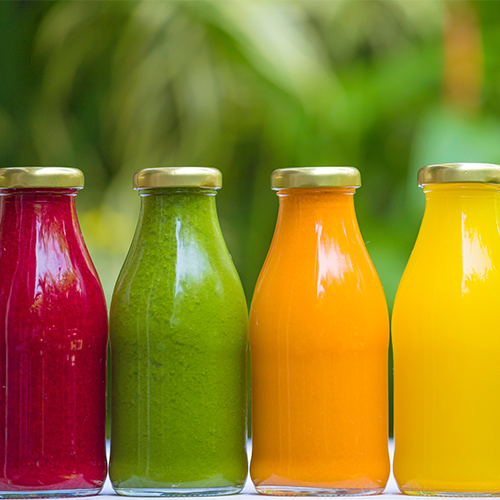
Although there are a variety of combinations you can experiment with when creating cold-pressed juices, there are a handful of common types that do best in a commercial setting. These juices are a spin-off of classic juice flavors, allowing customers to enjoy their favorite flavors while reaping the benefits of cold-pressed juices. If you’re considering adding cold-pressed juice to your menu, consider using the following juices to attract the most customers:
- Cold-Pressed Orange Juice - Made from freshly squeezed oranges, this juice is packed with vitamin C and other essential nutrients. It's a refreshing and tangy beverage that can be enjoyed on its own or used as a base for smoothies and cocktails
- Cold-Pressed Green Juice - This vibrant and detoxifying beverage is typically made with a combination of leafy greens like kale, spinach, and arugula, along with other ingredients like apples, ginger, and lemon. Cold-pressed green juice is an excellent way to boost your daily intake of vitamins, minerals, and antioxidants, all while promoting overall health and well-being.
- Cold-Pressed Lemonade - Made with freshly squeezed lemons, this tangy beverage is perfect for quenching your thirst on a hot summer day. Cold-pressed lemonade can also be customized with other fruits or herbs to add an extra twist of flavor.
- Cold-Pressed Carrot Juice - Carrots are rich in beta-carotene, which is converted to vitamin A in the body. This juice is not only refreshing but also provides a host of health benefits, including improved eye health and a strengthened immune system.
Shelf Life of Cold-Pressed Juice
Shelf life refers to the length of time that a product can be stored before it begins to deteriorate in quality or become unsafe to consume. The shelf life of cold-pressed juices typically ranges from three to five days when stored properly under refrigeration. That being said, there are a variety of factors that can extend or decrease the shelf life of a cold-pressed juice:
Cold-Pressed Ingredients
The shelf life of cold-pressed juice largely depends on the ingredients used. Some fruits and vegetables have a longer shelf life than others. For example, citrus fruits like oranges and lemons tend to last longer, while leafy greens like spinach and kale have a shorter lifespan. Additionally, the quality and freshness of the produce used can impact the juice's overall shelf life.
Processing Method
Cold-pressed juice is made using a hydraulic press that extracts the juice from fruits and vegetables without heat, preserving more nutrients and enzymes. This gentle extraction process helps extend the shelf life of the juice compared to traditional juicing methods. However, the shelf life can still be affected by factors like temperature and exposure to air during the juicing process.
Pasteurization
While cold-pressed juice is typically unpasteurized to retain its nutritional value, some manufacturers opt for a process known as high-pressure processing (HPP). HPP uses pressure to kill harmful bacteria and extend the shelf life of the juice. Pasteurized cold-pressed juice may have a longer shelf life but could also lose some of its nutritional benefits in the process.
Back to TopStoring Cold-Pressed Juices
Cold-pressed juices spoil faster compared to their pasteurized counterparts. This is because the absence of heat during the extraction process leaves the juices more vulnerable to spoilage and oxidation. Therefore, proper storage techniques are essential to preserve the nutritional value and extend the shelf life of your cold-pressed juices. Below, we cover some of the best ways to store and use cold-pressed juices to ensure you get maximum freshness and flavor:
Refrigeration
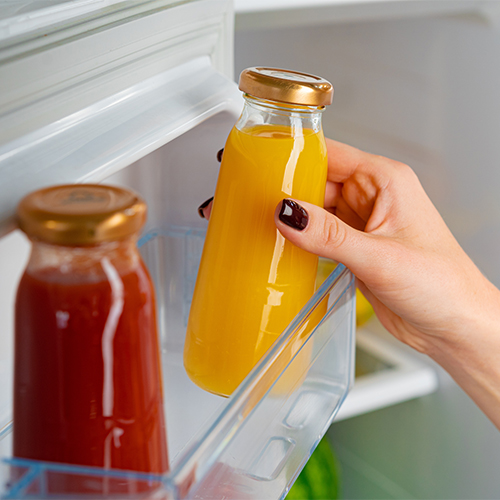
Cold-pressed juice is highly perishable and should be refrigerated at all times. The cold temperature helps slow down the growth of bacteria and enzymes that can cause spoilage. Keep your juice stored below 41°F (5°C) to maintain its freshness for as long as possible.
Use Air-Tight Containers
Oxygen is the worst enemy of fresh juice. Once exposed to air, the juice can oxidize and lose its nutritional value. Store your cold-pressed juice in airtight containers, such as glass bottles or jars with tight-fitting lids, to minimize contact with air and extend its shelf life.
Separate Different Juices
Consider storing different flavors separately. Mixing different juices can accelerate spoilage, as certain fruits and vegetables have shorter shelf lives. By storing them separately, you can enjoy each flavor at its freshest.
Consume within a Few Days
While the shelf life of cold-pressed juice can vary depending on the factors mentioned above, it's generally recommended to consume it within three to five days of juicing. This timeframe ensures that you're getting the maximum nutritional benefits and flavor from your juice.
Cold Press Juice vs Normal Juice
Both types of juice provide a convenient way to consume fruits and vegetables, they differ significantly in terms of production methods and nutritional content. While cold-pressed juice is often considered the healthier choice due to its gentle extraction process and higher nutrient content, other types of juice offer convenience and a longer shelf life. Discover the differences between cold-pressed juice and other types of juices below:
- Nutritional Benefits - Since the hydraulic press method does not generate heat, the enzymes, vitamins, and minerals found in the fruits and vegetables remain intact. In contrast, the heat generated during the centrifugal juicing process used in normal juicing can cause some loss of nutrients.
- Shorter Shelf Life - The high-pressure extraction process eliminates most of the oxygen, which helps to preserve the juice and prevent oxidation. However, the lack of heat from the pasteurization process means that cold-pressed juices often spoil faster than their pasteurized counterparts.
- Vibrant Taste - Due to the careful extraction process, cold-pressed juice often has a more intense and natural flavor compared to regular juice. The combination of fresh, high-quality ingredients and the absence of heat allows the true essence of the fruits and vegetables to shine through.
Whether you run a cafe, juice bar, or restaurant, incorporating cold-pressed juice into your menu can add a touch of freshness and vitality to your beverage selection. With a wide range of fruit and vegetable combinations available, businesses can create unique and flavorful juice blends to cater to their customer's preferences. More consumers are seeking out nutritious alternatives to sugary sodas and artificially flavored drinks, so offering cold-pressed juice can attract health-conscious customers and differentiate your establishment from the competition.
